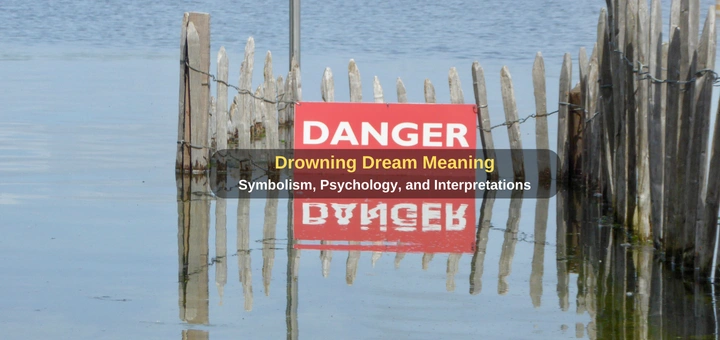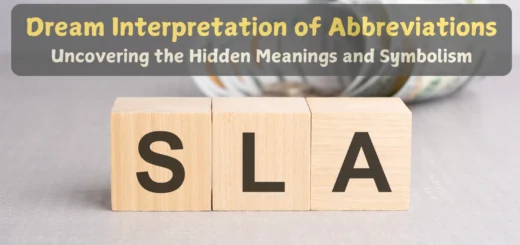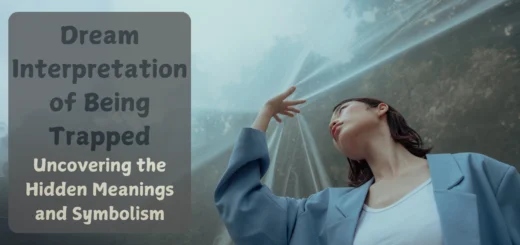Drowning Dream Meaning: Symbolism, Psychology, and Interpretations
Dreams about drowning are intense and often unsettling, evoking feelings of fear, helplessness, and vulnerability. This dream theme can symbolize a wide range of emotions and life situations, from being overwhelmed by stress to a deep desire for emotional release. The meaning of drowning in dreams depends heavily on the context, the dreamer’s emotions, and their personal experiences. In this comprehensive guide, we’ll explore the symbolism, psychological analysis, cultural perspectives, and spiritual meanings of drowning dreams to help you uncover their deeper message.

General Dream Interpretation
Drowning in dreams is often associated with feelings of being overwhelmed, emotionally suffocated, or out of control. Water, in general, represents emotions and the subconscious mind, and drowning can symbolize a struggle to cope with intense feelings or life circumstances. However, this dream theme can also have positive connotations, such as the need for emotional release or transformation. The interpretation of such dreams depends on the dream’s context and the dreamer’s emotions during the dream.
Positive Connotations:
- Emotional release and catharsis
- Transformation and rebirth
- Letting go of control and surrendering to change
Negative Connotations:
- Feeling overwhelmed or suffocated
- Fear of failure or losing control
- Emotional turmoil or unresolved trauma
Psychological Analysis
From a psychological perspective, drowning in dreams can reveal a lot about your emotional state and subconscious mind. Carl Jung viewed water as a symbol of the unconscious mind, and drowning might represent a struggle to navigate or integrate overwhelming emotions. This dream theme could indicate a need to confront and process deep-seated fears or unresolved issues.
Sigmund Freud, on the other hand, often linked drowning to repressed emotions or a fear of being consumed by one’s feelings. If you dream of drowning, it could be a manifestation of anxiety, stress, or a sense of helplessness in your waking life.
Cultural & Religious Perspectives
Drowning holds diverse meanings across cultures and religions. Here’s how different traditions might interpret this dream symbol:
Biblical Interpretations (Christianity):
In Christianity, water often symbolizes purification and renewal, but drowning can represent feelings of being overwhelmed by sin or life’s challenges. Dreaming of drowning might symbolize a need for spiritual cleansing or a cry for help in times of distress.
Islamic Dream Analysis:
In Islamic tradition, drowning in a dream can signify being overwhelmed by worldly concerns or emotional struggles. However, it can also represent the need for spiritual purification and reliance on divine guidance.
Hinduism & Other Spiritual Traditions:
In Hinduism, water is associated with the flow of life and emotional energy. Drowning in a dream might symbolize the need to release emotional baggage or surrender to the natural flow of life.
Common Dream Scenarios & Their Meanings
The specific scenarios in which drowning occurs can provide deeper insights into its symbolism. Here are some common dream scenarios and their interpretations:
Scenario 1: Drowning in Deep Water
If you dream of drowning in deep water, it often symbolizes feeling overwhelmed by intense emotions or life circumstances. This vision might indicate that you are struggling to cope with stress or unresolved issues.
Scenario 2: Watching Someone Else Drown
Dreaming of watching someone else drown can represent feelings of helplessness or guilt. It might also indicate that you are witnessing someone close to you struggle emotionally or mentally.
Scenario 3: Being Rescued from Drowning
If you dream of being rescued from drowning, it could symbolize hope, support, or a turning point in your life. This dream theme often represents the presence of help or guidance during difficult times.
Scenario 4: Struggling to Stay Afloat
Dreaming of struggling to stay afloat might indicate feelings of being overwhelmed or out of control. It could also represent a fear of failure or the need to find balance in your life.
Scenario 5: Peacefully Sinking Underwater
If you dream of peacefully sinking underwater, it might symbolize surrender, release, or a desire for emotional transformation. This vision could indicate a need to let go of control and trust the process of life.
Spiritual Symbolism & Personal Growth
In the realm of spirituality, drowning can symbolize the process of surrendering to change and releasing emotional baggage. Dreaming of drowning might indicate that you are undergoing a period of transformation or spiritual awakening. This dream theme could also represent the need to confront and release deep-seated fears or unresolved emotions to achieve inner peace.
If you frequently dream of drowning, it might be a sign to pay attention to your emotional well-being and take steps to address overwhelming feelings. Such dreams can also encourage you to embrace change and trust the natural flow of life.
Frequently Asked Questions About the Dream Meaning of Drowning
- What does it mean to dream about drowning?
Dreaming about drowning often symbolizes feeling overwhelmed, emotionally suffocated, or out of control. It can represent a situation or emotion that feels too much to handle. This dream encourages you to seek support and find ways to regain control.
- What does it mean to dream about drowning in water?
Dreaming about drowning in water often represents emotional overwhelm, fear, or feeling consumed by your feelings. It may indicate that you are struggling with intense emotions or a situation that feels out of your depth. This dream encourages you to seek clarity and emotional balance.
- What does it mean to dream about drowning in the ocean?
Dreaming about drowning in the ocean can symbolize feeling overwhelmed by vast emotions, challenges, or the unknown. It may indicate that you are navigating deep feelings or a complex situation. This dream encourages you to stay afloat and trust your ability to handle challenges.
- What does it mean to dream about drowning in a river?
Dreaming about drowning in a river often represents being swept away by emotions, life’s challenges, or a fast-paced situation. It may indicate that you are struggling to keep up or feeling out of control. This dream encourages you to find stability and regain your footing.
- What does it mean to dream about drowning in a pool?
Dreaming about drowning in a pool can symbolize feeling overwhelmed in a controlled or familiar environment. It may indicate that you are struggling with emotions or a situation that should feel manageable. This dream encourages you to address the source of your stress and seek support.
- What does it mean to dream about drowning in a lake?
Dreaming about drowning in a lake often represents feeling overwhelmed by emotions or a situation that seems calm on the surface. It may indicate that you are struggling with hidden feelings or unresolved issues. This dream encourages you to explore your emotions and seek clarity.
- What does it mean to dream about drowning in mud?
Dreaming about drowning in mud can symbolize feeling stuck, overwhelmed, or weighed down by a situation. It may indicate that you are struggling to move forward or feeling trapped. This dream encourages you to find ways to free yourself and regain control.
- What does it mean to dream about drowning in quicksand?
Dreaming about drowning in quicksand often represents feeling trapped, overwhelmed, or sinking deeper into a difficult situation. It may indicate that you are struggling to escape or feeling powerless. This dream encourages you to seek help and find ways to regain control.
- What does it mean to dream about drowning and being saved?
Dreaming about drowning and being saved can symbolize hope, rescue, or overcoming a difficult situation. It may indicate that you are receiving support or finding a way out of a challenging phase. This dream encourages you to trust in the help around you and stay resilient.
- What does it mean to dream about drowning and waking up scared?
Dreaming about drowning and waking up scared often represents fear, anxiety, or feeling overwhelmed in your waking life. It may indicate that you are struggling with a situation or emotion that feels too much to handle. This dream encourages you to address the source of your fear and seek support.
- What does it mean to dream about drowning and feeling calm?
Dreaming about drowning and feeling calm can symbolize acceptance, surrender, or a desire for release. It may indicate that you are letting go of control or embracing a difficult situation. This dream encourages you to trust the process and find peace in the moment.
- What does it mean to dream about drowning and struggling to breathe?
Dreaming about drowning and struggling to breathe often represents feeling suffocated, overwhelmed, or emotionally drained. It may indicate that you are dealing with a situation or emotion that feels too much to handle. This dream encourages you to seek support and find ways to regain control.
- What does it mean to dream about drowning and calling for help?
Dreaming about drowning and calling for help can symbolize a cry for support, recognition, or assistance. It may indicate that you are feeling overwhelmed and need help in your waking life. This dream encourages you to reach out to others and seek the support you need.
- What does it mean to dream about drowning and no one helping?
Dreaming about drowning and no one helping often represents feelings of isolation, helplessness, or lack of support. It may indicate that you are struggling with a situation and feel alone. This dream encourages you to seek help and build a support system.
- What does it mean to dream about drowning and surviving?
Dreaming about drowning and surviving can symbolize resilience, overcoming challenges, or finding a way out of a difficult situation. It may indicate that you are strong enough to handle what life throws at you. This dream encourages you to trust in your ability to persevere.
- What does it mean to dream about drowning and dying?
Dreaming about drowning and dying often represents transformation, letting go, or the end of a phase. It may indicate that you are releasing something that no longer serves you or undergoing a significant change. This dream encourages you to embrace transformation and trust in new beginnings.
- What does it mean to dream about someone else drowning?
Dreaming about someone else drowning can symbolize concern for that person or a reflection of your own emotions. It may indicate that you are worried about their well-being or projecting your feelings onto them. This dream encourages you to communicate openly and offer support.
- What does it mean to dream about saving someone from drowning?
Dreaming about saving someone from drowning often represents support, rescue, or helping someone in need. It may indicate that you are providing assistance or guidance to someone in your waking life. This dream encourages you to continue being a source of strength for others.
- What does it mean to dream about drowning in a dream?
Dreaming about drowning in a dream often represents feeling overwhelmed, emotionally suffocated, or out of control. It may indicate that you are struggling with a situation or emotion that feels too much to handle. This dream encourages you to seek support and find ways to regain control.
Conclusion
Dreams about drowning are rich in symbolism and can offer valuable insights into your emotional state, subconscious mind, and spiritual journey. Whether this vision represents feelings of being overwhelmed, a need for emotional release, or a process of transformation, its meaning ultimately depends on your personal experiences and the context of the dream. By reflecting on your emotions, current challenges, and the specific scenarios in your dream, you can uncover the true significance of this powerful symbol.
If you’ve recently dreamed of drowning, take a moment to consider what it might be trying to tell you. Are you feeling overwhelmed by stress or emotions? Do you need to release control and surrender to change? Or is this dream a reminder to seek support and guidance during difficult times? Whatever the case, understanding the meaning of your dream can help you navigate your waking life with greater clarity and purpose.
Additional Information:
Whether you searched for dream interpretation of drowning, meaning of dreaming drowning, Biblical meaning of drowning in dream, drowning dream meaning, or asked what does it mean when you dream about drowning, these insights are here to guide you. Our "drowning dream meaning" page aims to help you understand your subconscious experiences. As always, consider your personal context and emotions for a more accurate interpretation.
Personalized Dream Interpretation
As a professional dream analyst, I want to remind you that every dream is deeply personal. Factors such as your current mood, recent life events, past experiences, personal relationships, and even changes in your health can all influence what a dream means to you. If the interpretation provided here does not fully address your personal circumstances or leaves you with lingering questions, please feel free to share more details in the comments. By understanding the context of your life and emotions, we can work together to arrive at a more accurate and meaningful interpretation tailored uniquely to you.

















